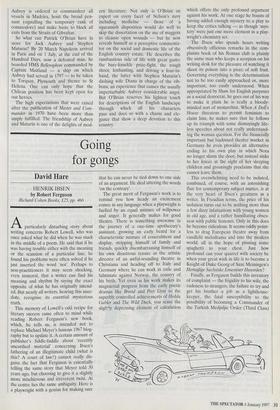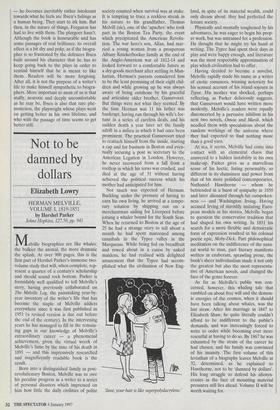Going for gongs
David Hare
HENRIK IBSEN Aparticularly disturbing story about writing concerns Robert Lowell, who was once asked what he did when he was stuck in the middle of a poem. He said that if he was having trouble either with the meaning or the scansion of a particular line, he found his problems were often solved if he just inserted the word 'not'. Perhaps to non-practitioners it may seem shocking, even immoral, that a writer can find his meaning and rhythm by saying the exact opposite of what he has originally intend- ed. But nearly all writers, hearing this anec- dote, recognise its essential mysterious truth.
This memory of Lowell's odd recipe for literary success came often to mind while reading Robert Ferguson's new book, which, he tells us, is intended not to replace Michael Meyer's famous 1967 biog- raphy but to update it. A certain amount of publisher's fiddle-faddle about 'recently unearthed material' concerning Ibsen's fathering of an illegitimate child (what is this? A court of law?) cannot really dis- guise the fact that Ferguson is essentially telling the same story that Meyer told 30 years ago, but choosing to give it a slightly more mischievous and irreverent twist. At the centre lies the same ambiguity. Here is a playwright with a genius for making sure that he can never be tied down to one side of an argument. He died uttering the words `on the contrary'.
The great merit of Ferguson's work is to remind you how heady an excitement comes in any language when a playwright is fuelled by an equal mixture of willpower and anger. It generally makes for good theatre. There is something awesome in the journey of a one-time apothecary's assistant, growing an early beard for a characteristic mixture of concealment and display, stripping himself of family and friends, quickly disembarrassing himself of his own disastrous tenure as the artistic director of an awful-sounding theatre in Christiana and heading off to Italy and Germany where he can work in exile and fulminate against Norway, the country of his birth. Yet even as his work makes its magisterial progress from the early poetic dramas like Brand and Peer Gynt to the superbly controlled achievements of Hedda Gabler and The Wild Duck, you sense the slightly depressing element of calculation
which offers the only profound argument against his work. At one stage he boasts of having added enough mystery to a play to keep the critics talking — as though 'mys- tery' were just one more element in a play- wright's chemistry set.
The Ibsen who spends hours writing obsessively officious remarks in the com- plaints book of his Roman club is plainly the same man who keeps a scorpion on his writing desk for the pleasure of watching it shoot its poison into a piece of soft fruit. Governing everything is the determination not to be too easily approached or, more important, too easily understood. When appropriated by Shaw for English purposes as a social democrat, he goes out of his way to make it plain he is really a bloody- minded sort of monarchist. When A Doll's House threatens to permit feminists to claim him, he makes sure that he follows up its triumph with some dismayingly life- less speeches about not really understand- ing the woman question. For the financially important but backward theatre market in Germany he even provides an alternative ending to his own play in which Nora no longer slams the door, but instead sinks to her knees at the sight of her sleeping children and groaningly proclaims that she cannot leave them.
This overwhelming need to be isolated, combined, of course, with an astonishing flair for contemporary subject matter, is at the very heart of Ibsen's greatness as a writer. In Freudian terms, the price of his isolation turns out to be nothing more than a few dizzy infatuations with young women in old age, and a rather humiliating obses- sion with public honours. Only in this does he become ridiculous. It seems oddly point- less to drag European theatre away from candlelit melodrama and into the modern world, all in the hope of pinning some spaghetti to your chest. Just how profound can your quarrel with society be when your great wish in life is to become a Knight of Duke Georg of Saxe Meiningen's Hertuglige Sachsiske Ernestiner Husorden?
Finally, as Ferguson builds this inventory of complaint — the frigidity to his wife, the .rudeness to strangers, the failure to try and get his brother a job as a lighthouse- keeper, the fatal susceptibility to the possibility of becoming a Commander of the Turkish Medjidjie Order (Third Class) — he becomes inevitably rather intolerant towards what he feels are Ibsen's failings as a human being. They start to irk him. But then, in the nature of things, Ferguson has had to live with them. The playgoer hasn't. Although the book is honourable and has some passages of real brilliance, its overall effect is a bit dry and poky, as if the biogra- pher is so frustrated by the defences Ibsen built around his character that he has to keep going back to the plays in order to remind himself that he is meant to like them. Readers will be more forgiving. After all, it is not the purpose of a writer's life to make himself sympathetic to biogra- phers. More important to most of us is that stuffy, neurotic and deeply uncomfortable as he may be, Ibsen is also that rare phe- nomenon, the playwright whose plays went on getting better in his own lifetime, and who with the passage of time seems to get better still.



























































 Previous page
Previous page